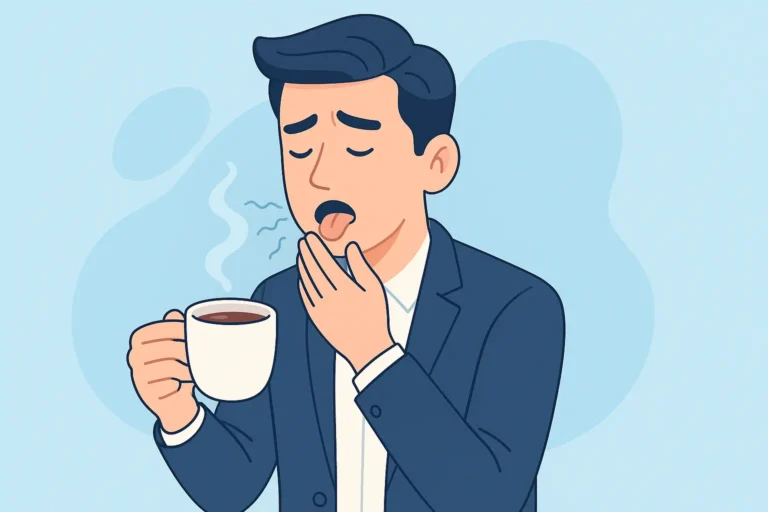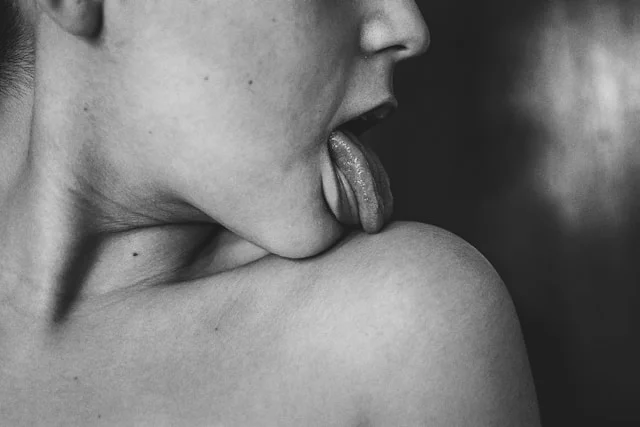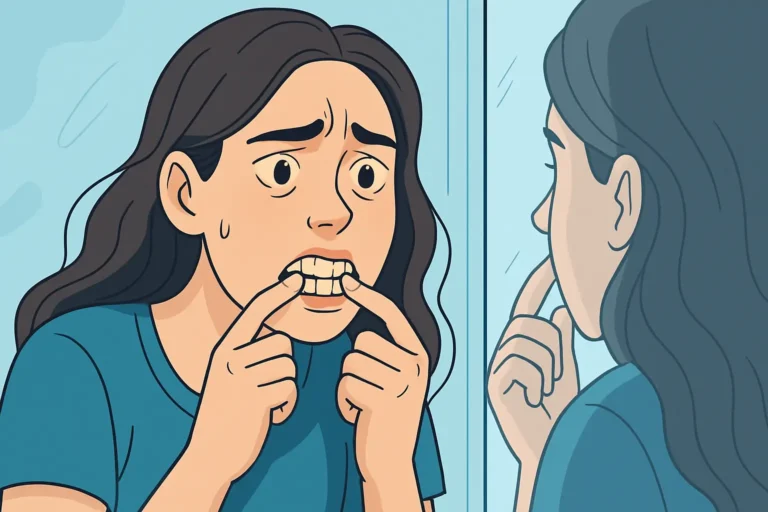Why Do I Wake Up With Dry Mouth in the Morning?
Waking up with a dry mouth in the morning usually happens because your body isn’t producing enough saliva overnight. The most common culprits are sleeping with your mouth open, dehydration, certain medications, or underlying health conditions.
If it happens occasionally, it’s usually not a big deal. But if you notice it every morning, it’s worth figuring out what’s behind it—because untreated dry mouth can lead to bad breath, tooth decay, and a rough start to your day.
What Actually Causes Morning Dry Mouth?
Your mouth should stay moist at night thanks to saliva. Saliva doesn’t just keep you comfortable—it also washes away bacteria and helps protect your teeth.
But several things can interfere with this natural process.
- Mouth breathing: If you sleep with your mouth open, air dries out your saliva quickly. This often happens with nasal congestion or snoring.
- Dehydration: Not drinking enough water during the day means your body has less fluid to make saliva.
- Medications: Many common prescriptions, like antihistamines, antidepressants, and blood pressure medicines, list dry mouth as a side effect.
- Health conditions: Diabetes, sleep apnea, and autoimmune disorders can all contribute to chronic dryness.
Why Morning Dry Mouth Feels Worse
Dry mouth in the morning feels different from dryness during the day. Overnight, you’re not drinking water or stimulating saliva production by chewing. That means your mouth is “drying out” for 6–8 hours straight.
This is why you might wake up with sticky saliva, bad breath, or even a sore throat. If you notice white patches on your tongue or frequent cavities, it’s a sign your mouth is staying dry too often.
Quick Fixes You Can Try Tonight
The good news? There are simple steps you can try before going to bed that may make a huge difference.
- Stay hydrated: Drink water throughout the day, not just before bed. Your body hydrates better if you spread it out.
- Limit alcohol and caffeine: Both dry out your mouth and can make symptoms worse overnight.
- Keep water by your bed: A quick sip in the night can relieve dryness without fully waking you.
- Run a humidifier: Adding moisture to your bedroom air helps if your mouth dries out due to open-mouth breathing.
Adjusting Sleeping Habits
If you’re waking up with a dry mouth most mornings, check your sleeping position and breathing. Sleeping on your back makes mouth breathing more likely, while side sleeping can help keep your lips closed.
Nasal congestion is another factor. Allergies, colds, or even a deviated septum may force you to breathe through your mouth at night. Saline sprays, nasal strips, or talking to an ENT doctor can help improve airflow through your nose.
How Your Lifestyle Plays a Role
It’s easy to overlook daily habits that might be drying you out. For example, smoking doesn’t just dry the mouth—it also damages the salivary glands. Alcohol before bed can also reduce saliva flow, leaving you parched in the morning.
Even your evening diet matters. Salty foods, spicy dishes, or late-night snacks can make your mouth drier overnight. If morning dryness is a recurring problem, try adjusting your evening routine and see if symptoms improve.
When to Worry About Morning Dry Mouth
Occasional morning dryness isn’t usually a reason to panic. But if you notice these signs, it’s worth talking to your doctor or dentist:
- Chronic bad breath even after brushing
- Frequent cavities or tooth decay
- Cracked lips or sores at the corners of the mouth
- Difficulty swallowing dry foods
- Thick, stringy saliva every morning
These can point to chronic dry mouth (xerostomia), which needs a more tailored approach.
Long-Term Solutions That Actually Work
If you’ve ruled out dehydration and lifestyle habits, but dry mouth still greets you every morning, you might need a more specific solution.
- Talk to your doctor about medications: If your prescription is causing dryness, sometimes the dosage can be adjusted or swapped for another option.
- Saliva substitutes: Special mouthwashes, sprays, or gels mimic saliva and keep your mouth moist overnight. Look for ones labeled “dry mouth relief” and alcohol-free.
- Dental check-ups: Your dentist can spot early damage caused by dryness and suggest fluoride treatments or sealants to protect your teeth.
- Address sleep issues: If you snore or have sleep apnea, a CPAP machine or mouth guard may help reduce open-mouth breathing and dryness.
Small Daily Habits That Protect You
Even if you can’t fully stop dry mouth, you can prevent most of the side effects.
- Chew sugar-free gum: This stimulates saliva naturally.
- Brush and floss carefully: Dry mouth increases cavity risk, so extra care is important.
- Switch to a gentle toothpaste: Some whitening pastes or strong flavors can irritate dry tissue—opt for mild, fluoride-based ones.
- Carry water during the day: Sipping often can make the mornings less harsh.
These little changes add up and can save you from long-term dental issues.
Final Thoughts
Waking up with a dry mouth in the morning is common, but it doesn’t have to be your normal. In most cases, the cause is simple—like dehydration, mouth breathing, or a side effect of medications.
The key is paying attention to patterns and making small adjustments. Start with hydration, bedroom humidity, and sleeping position. If that doesn’t help, check with your doctor or dentist for tailored solutions.
A moist, healthy mouth in the morning sets the tone for the rest of your day—and protecting your saliva flow is one of the best things you can do for your overall health.







